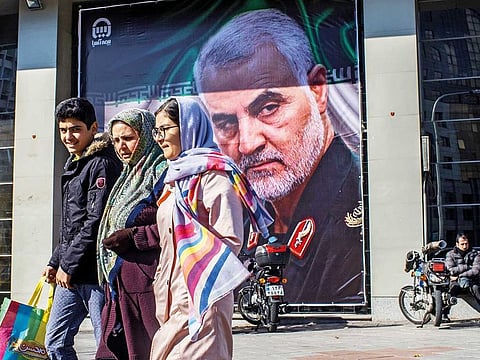Ahead of first anniversary of Soleimani’s death, Iran still eyeing retaliation against US
US showed ‘level of will that perhaps Iran did not believe we would be able to have’

Washington: Nearly a year after the US air strike that killed a revered Iranian military leader, a senior American general said that Tehran is still considering retaliatory steps, raising the possibility of renewed confrontation with Iran in the Trump administration’s final days.
The State Department has already withdrawn some personnel from the US Embassy in Baghdad ahead of the first anniversary of the January 3, 2020, strike on Maj. Gen. Qasem Soleimani, who directed a network of armed groups across the Middle East that have launched violent attacks on Americans.
While the pace of rocket and missile fire at US forces in Iraq has slowed in recent months, militiamen fired rockets at Baghdad’s Green Zone as recently as this past Sunday. No US personnel were wounded or killed.
Gen. Kenneth “Frank” McKenzie Jr., who heads the US Central Command, said Iranian leaders would like to see further retaliation but were still grappling with internal disarray that has followed the loss of a leader who was the “mastermind” of militant activity by groups from Iraq to Lebanon to Yemen.
Speaking to reporters by phone during an overseas trip, McKenzie said Soleimani’s death had forced Iranian leaders to rethink their approach to the United States.
“The Iranians have never doubted our capability to respond. They never doubted that. But they’ve often doubted our will to respond,” McKenzie said. “I think that the Soleimani episode last January sort of set them back and they had to recalculate the will of the United States. We demonstrated a level of will that perhaps they did not believe that we would be able to have.”
McKenzie said the sudden death of someone he described as a charismatic leader and a “ruthless bureaucratic operator” also weakened Iran’s grip on militia groups in Iraq that have long been a threat to American personnel, injecting another element of unpredictability into American attempts to anticipate and prepare for further Iranian retaliation.
Dissonance
“The death of Soleimani unhinged Iran’s ability to direct these units forcefully. . . . So I think there’s actually a lot more dissonance between these groups and among these groups as they go forward - not necessarily a bad thing,” he said. “But at the same time, it also opens the door for people to make an unapproved attack. And we have to watch out for that as well.”
The events surrounding the Soleimani strike marked the most dramatic moments of a slow-motion escalation between the Trump administration and Iran, which the White House has identified as a chief adversary. The United States has applied repeated rounds of sanctions against Iran and sought to isolate the country diplomatically after pulling out of the 2015 international nuclear deal.
After the strike, which also killed a senior Iraqi militia figure, Iran launched missiles at a US base in Iraq, causing brain injuries among some troops.
American officials have described what they see as an uneasy detente with Iran over the course of the past year, as Tehran reassesses and, more recently, appears to be holding fire in anticipation of the American presidential transition.
President-elect Joe Biden has said he intends to rejoin the nuclear deal, possibly signalling a more conciliatory policy towards Iran.
Internal security
The Iraqi government is now attempting to split militias who have professed loyalty to Iran from those that officials see as helpful to maintaining the country’s internal security. Militiamen were key in defending Iraq against Daesh after the extremist group took over large portions of the country in 2014.
McKenzie said US forces were ready for any attempted attacks. Earlier this year, the US military placed new air defence systems in Iraq to protect US forces there. This month, it sent B-52 strategic bombers to the Middle East in a show of force.
But the decreased cohesiveness following Soleimani’s death also makes it harder to predict what will occur, he acknowledged.
Now, “there’s a possibility that they will be less coordinated and some lower-level actor might have an opportunity to do something,” McKenzie said. “But, you know, that’s just the nature of the region that we are [in] and the nature of these rogue groups. And that’s always a risk in Iraq.”
Sign up for the Daily Briefing
Get the latest news and updates straight to your inbox







